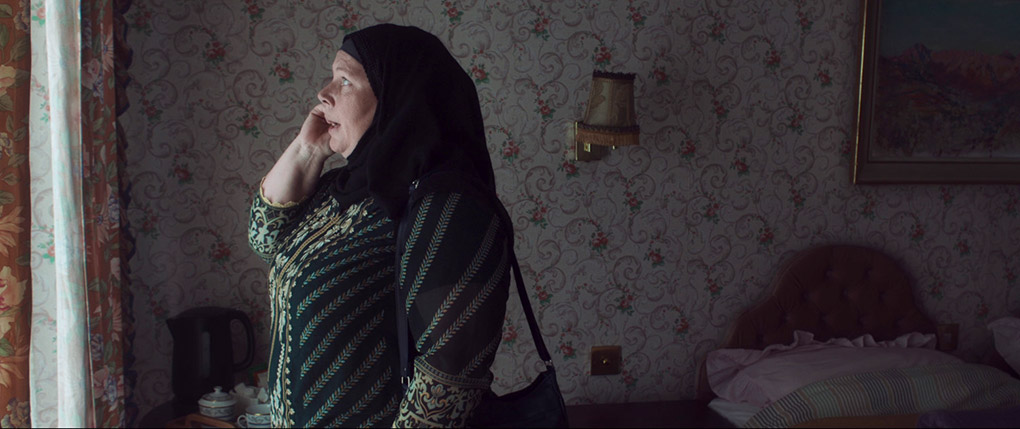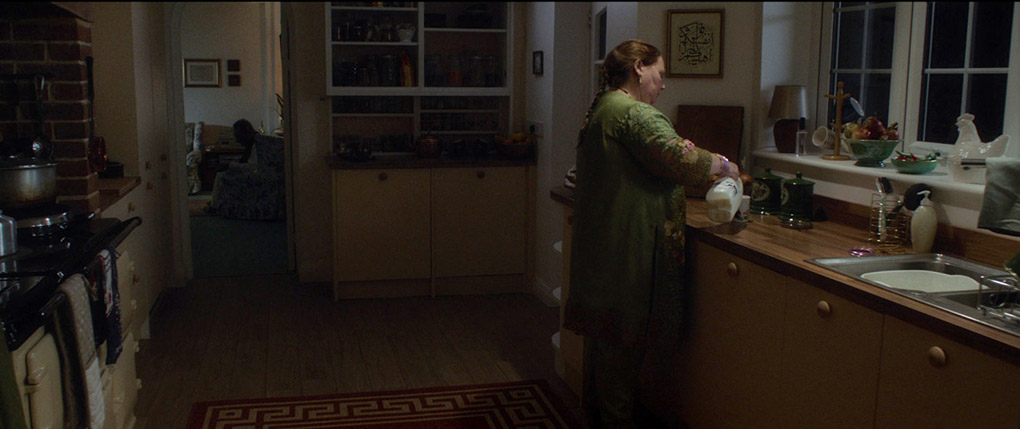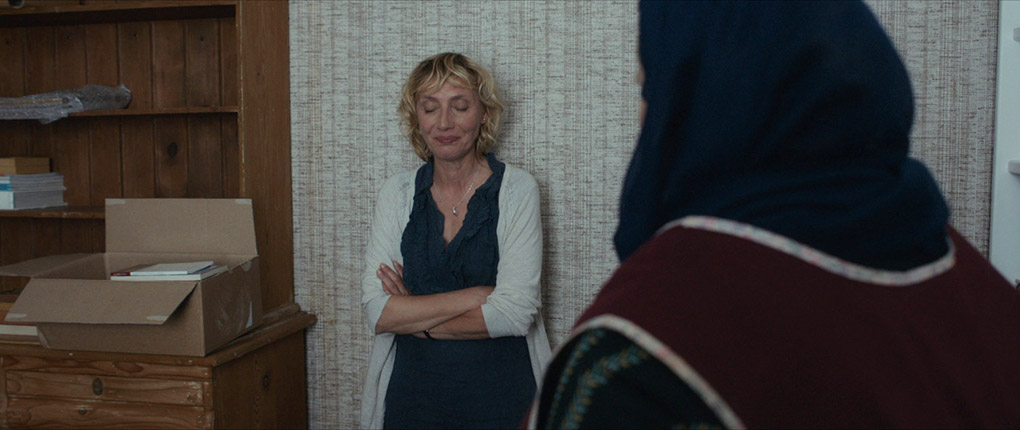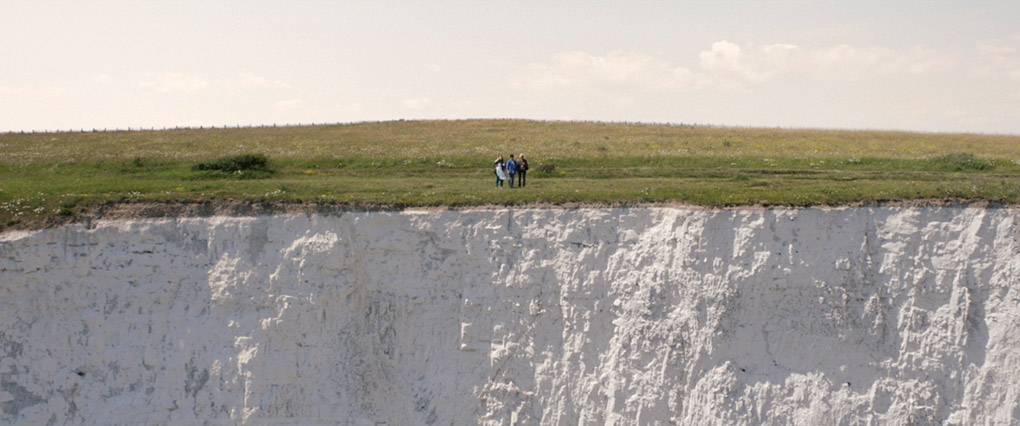|
We begin after dark, in a house in Dover. Mary (Joanna Scanlan), a white woman who converted to Islam on her marriage, and her husband Ahmed (Nasser Memarzia) are returning from an evening out. Mary, or Fahima to give her her Muslim name, makes them both a cup of tea. The camera doesn’t move, the Scope frame keeping Mary to screen right, Ahmed through a doorway to the left. Two doorways make frames within the frame, a device that will recur throughout this film. Mary takes Ahmed the tea...but he has stopped speaking, stopped moving. She calls his name: “Ahmed, love…?” The last word we hear is “Love”...and then the title card comes up. What follows is afterwards, hence the title.
Mary goes through the mourning rituals with her friends and relatives. Then she finds an ID card of a French woman called Geneviève (Nathalie Richard) who lives in Calais. Ahmed worked on the cross-Channel ferry and it seems Ahmed has been carrying on a relationship with Geneviève while still married to Mary. Mary travels to Calais and meets Geneviève, who lives with her son Solomon (Talid Ariss), who, it turns out, was fathered by Ahmed. Geneviève mistakes Mary for the cleaner, as she is in the process of moving house. So in time, Mary effectively becomes part of the household, but all three of them have secrets which are in danger of coming to light. While Mary had no knowledge of Ahmed’s double life, Geneviève was aware that he had a wife in the UK but knew no more than that.

After Love is an impressive debut feature by writer/director Aleem Khan. Inevitably the film is informed by his own background. You could remove Mary’s faith and the story would work just as well, but centring the film on a white, middle-aged Muslim convert is something you don’t often see. However, the experience of grief and the sense that people closest to you can seem completely different to the way you knew them, are universal.
That applies to both the “Muslim convert” and “middle-aged” parts of that sentence. Khan does take time to show how Islam is part of Mary’s life, even though her conversion was something she did for her husband “that no one else could do” (and she wears a hijab when in public), and it is still part of her life even though her husband is dead. So we see her at prayer and we see mourning rituals and the aqiqah ceremony (the Muslim equivalent to baptism).
Joanna Scanlan gives a remarkable performance as Mary. There aren’t that many films which give such rich lead roles to women of her age (late fifties) and women who don’t look like models – more to the point, women who have folds of flesh and stretchmarks that we see on display at one point. Scanlan was something of a late starter to acting: her first screen credit was in 1997, the year she turned thirty-six. She’s had lead roles before – such as in the television series No Offence – but she turns in career-best work here. Nathalie Richard and Talid Ariss are fine (the film is more or less a three-hander) but it’s Scanlan’s film. You’d hope that there will be many roles as good as this in her future, but you have to wonder if that will be the case. Scanlan does get the film past some small contrivances: answering Ahmed’s phone as him is without doubt a bad idea, and with many stories like this, telling the truth much earlier would have resulted in a much shorter film. Also, where did Mary get hold of a cleaner’s uniform?

Khan’s control of his film – basically one long build-up to a truth-telling and catharsis – is impressive too. Sometimes the symbolism is a little over-determined: using cracks appearing in things as a symbol is one thing, but having part of the White Cliffs of Dover crumble into the sea is another. (And that’s clearly a hallucination as no one else on the ferry is paying it any attention.) Those cliffs are where Mary used to wait for Ahmed to return from a Channel crossing and the stretch of water is a gulf that separates not just Dover and Calais but Mary and Geneviève too. But can a connection be made across that gulf? Ultimately Ahmed is a means for that connection to be made, his motivations for leading a double life never to be known.
Minor misgivings apart, After Love is an excellent film with a fine performance at its heart.
After Love is a Blu-ray release from the BFI, encoded for Region B only. The film itself has a 12 certificate, but the package is raised to a 15 due to the strong language in the short Three Brothers.
The film was shot digitally on the Arri Alexa SXT, and the Blu-ray transfer is in the intended ratio of 2.39:1. There’s not much to say about a film which was in the digital realm from shooting to the DCP you would have seen in a cinema. You’d expect it to look pristine and it does. Alexander Dynan’s cinematography (he worked previously with Paul Schrader on First Reformed) mutes the colours early on – the funeral scene is dominated by the white of Mary’s hijab and abaya – and although there are plenty of whites, those cliffs included, the palette becomes warmer once Mary arrives in Calais.

The soundtrack is available in two options, DTS-HD MA 5.1 and LPCM 2.0 surround. There’s not a great deal of difference between the two, though the latter is mixed slightly the louder of the two. The subwoofer gets some use, for example when those cliffs crumble. There is also an audio-descriptive track, in LPCM 2.0 surround. There are two sets of subtitles: English translating the other languages spoken (mostly French but some Arabic and Urdu) and English hard-of-hearing.
Q &A (46:23)
Recorded virtually in May 2021, this features Aleem Khan, Joanna Scanlan and Nathalie Richard, moderated by Isra Al Kassi. Khan begins by saying that the film has its roots in his own experience of otherness when young. He was keen to show Muslim rituals respectfully, as they’re rarely shown on screen. Scanlan and Richard talk about how they had been attracted to the script and the challenge of playing roles in more than one language. (Khan himself does not speak French, so he had input from a French producer and also had Richard and Talid Ariss tweak their lines.)
Trailer (2:00)
Teaser (0:58)
You can sense a little uncertainty as how to promote this film. The teaser emphasises Mary’s conversion and the longer trailer devotes more time to the secrets-coming-to-light narrative. Both use Geneviève’s line that we all break the rules we set for ourselves.
Image gallery (3:26)
Self-navigating, this begins with two poster designs and continues with production stills, both in colour and black and white.
Three Brothers (17:12)
The third of three shorts Khan made before his first feature, Three Brothers, from 2014, was BAFTA-nominated for Best Short Film. Somewhere in the Medway Towns, Hamid (Zain Muhammed Zafar) has to look after his two younger brothers when his father (Kulvinder Ghir) leaves them to go back to Pakistan. A touching film, but it does feel like a step towards a more achieved first feature.

Booklet
The booklet runs to thirty-two pages and is available in the first pressing only. It begins with Aleem Khan’s director’s statement, which shows a photograph of his mother and her father, shortly after she had recently converted to Islam on marriage, and she was in part the inspiration for the character of Mary. The booklet continues with “Muslim on Her Own Terms” by Suhaiymah Manzoor-Khan, which details the ways Mary’s experience, despite her being white, mirrors those of visibly Muslim women in general: Geneviève’s assumption that Mary is there to be a cleaner, cutting short any attempt by Mary to reveal who she actually is by constantly taking phone calls, assuming her to be subservient. However, Manzoor-Khan says, Mary has agency of her own and remains Muslim even though the husband she converted for is now dead.
On a related theme is “Why the Details Matter: On Shaping a Film and Identity Through Rituals”, by Isra Al Kassi, which deals with the film’s intention of showing Muslim rituals and getting them right – why a hard-of-hearing subtitle saying “chants in a foreign language” shouldn’t be sufficient. (“Recites” rather than chants, and the language would be Arabic.) And she points out examples where the filmmakers get it laughably wrong: her example is Morgan Freeman’s character in Robin Hood: Prince of Thieves. The number of films where she says that they get it right is small: the Australian comedy Ali’s Wedding is one.
After this are two pages of notes from producer Matthieu de Braconier, which serves as a timeline of the film’s production: from 2013 when Khan first pitched the idea to shooting in the summer of 2019 and post-production completed just as the pandemic hit, which precluded a premiere at Cannes. This is followed by a short interview with Khan by Will Massa, reprinted from the June 2021 issue of Sight & Sound. The booklet also includes full film credits, notes and credits for the extras, and stills.
An excellent first feature which serves as proof that, if we didn’t know it already, that Joanna Scanlan is one of the UK’s best actresses right now. It is well presented on Blu-ray by the BFI.
|